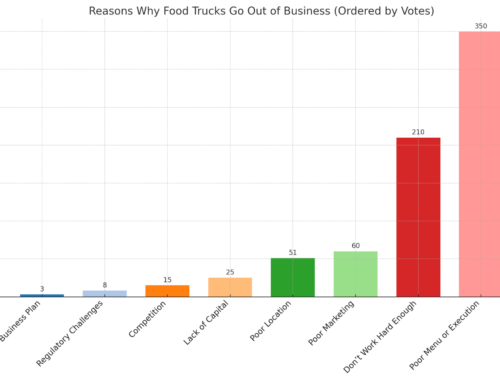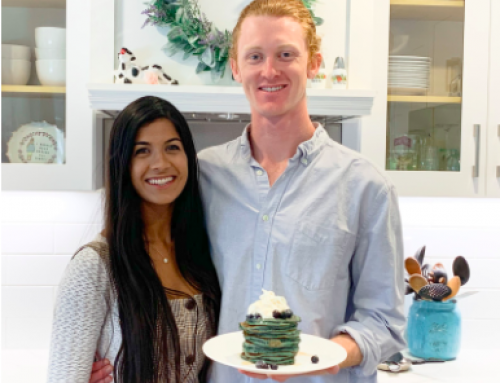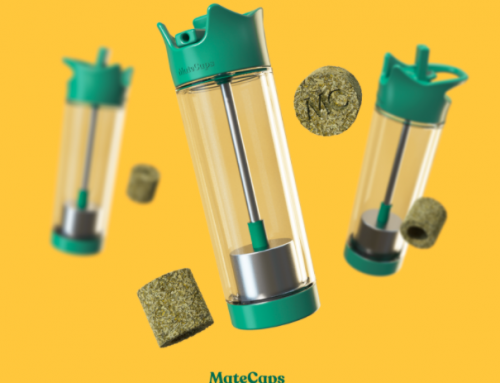Hello! Who are you and what food business did you start?
My name is Sasha Crescentini and I am the co-founder of Bakeology, a snack company founded in 2013. My mom and I started Bakeology in our home kitchen in the sunny little town of Malibu, CA.
Bakeology is a brand that produces and markets a line of Crunchy Cookie Bites that make you do a happy dance (we hope!). We pride ourselves on making Gluten-Free, Vegan, Non-GMO cookies that actually taste good. We sell to stores like Whole Foods, Gelsons, Pavilion’s, Mothers Market, Vons, Ralph’s and many more stores across the US.
You can also find our Cookies on United Airlines along with many food service accounts, biz HQ’s, coffee shops, and boutique hotels.
What are your ballpark sales numbers?
We started out doing $10k in sales in 2013 and we will likely hit $900k this year.
How did you come up with the idea?
I was in college studying Communications..and to be honest, I was super unhappy. I didn’t feel like I was thriving or enjoying my studies. I spoke to my dad, an entrepreneur who thrives on risk, and he told me to look out for a spark, or something that lit me up while at the same time, providing a service to others.
A few months later, it hit me as I was baking a birthday cake on the weekend at my mom’s house. I realized that baking for others lights me up as well as others. That was the spark I was looking for.
I began experimenting with unique flour blends, non-traditional vegan fats, and developed a formula to replace regular flour, butter and eggs with healthier alternatives without sacrificing flavor.
That’s when Scrumptious Soul, a gluten-free, vegan catering company, began. I was 20 years old with a mission to spread sweetness.
During my time in the catering biz, I was able to test out a large range of delicious, healthy desserts- anything from pies, sweet breads to cookies. I was able to refine recipes and discover which desserts were a huge hit with all types of people. It turns out, “clean” cookies were a favorite.
I knew I didn’t want to be in the catering biz forever. I wanted my treats to be available to the masses. That’s when I set my sights on creating a really yummy, clean-ingredient, plant-based brand.
In the meantime, my mom, Dawn, was very close to opening her dream restaurant. She is a master cook and baker who was trained by a French pastry chef as a teen. She was about to sign the lease on a space, when my dad suggested we work together. We looked at each other with excitement, and the rest is history.
Take us through the process of developing and producing your first product?
We had a long way to go and there was lots of excitement combined with seriousness. I definitely wasn’t able to lead the normal life of a 20 year old and I was okay with that.
Along with perfecting the products came figuring out packaging, getting all of the right licenses, machinery, suppliers etc. Over a period of about 6 months, we finalized branding, packaging, forming an LLC, getting our company name trademarked etc. It was a messy, busy time, but we were able to maintain laser- focus.
Throughout this time, we began establishing relationships with a few local markets. We’d walk into a store, ask for the buyer, and bring samples. The cookies were a hit! The product was received really well and buyers were so generous with their time and advice.
Some of the buyers we spoke gave us lots of advice and provided a list of items we needed to sort out prior to selling our product in their stores, such as UPC codes on the packaging and a bunch of other things I honestly cannot remember.
Now, we needed a space to produce. After a long, unsuccessful search for commercial kitchens, my uncle told us about the Cottage Food’s Permit, which enabled small, shelf-stable, non-perishable producers to make their product in their home kitchen. We were all over it. We prepared for the inspection and passed! We were in business.
Describe the process of launching the business.
We were officially in business. We’d bake & pack on a Tuesday, and deliver on Thursdays. We had two customers and life was simple. We were in no rush to grow fast and knew we wanted to really fine tune our product and have gradual growth. The reason being we weren’t looking for outside investors, so everything was self-funded and we kind of wanted to ease into business rather than have huge overhead right away.
There were lots of small services that added up pretty quick: we hired a mutual friend to build the website, a baking assistant to help in the kitchen, a brand ambassador to do in-store demos etc. and we were able to hit the ground selling our products.
The cookies seemed to be an easy sell and very in-demand. Every time we pitched, we gained a new customer. Over a period of about 6 months, we landed about 25 different accounts.
We decided we needed to approach a distributor, because we were running around town and tiring ourselves out. So, our great customer recommended us reaching out to a local So Cal distributor. We hit it off, and the rest was history. From there, we were able to pitch to bigger chain stores since we knew the distributor was able to deliver to more locations.
As we grew, we also realized we needed to invest in machinery. Hand scooping was not cutting it anymore. Our hands were in pain and we couldn’t keep up with orders. We did a lot of research and decided to test on a machine up in Canada. The machine worked great, and we made our first large purchase: a $25k mini dopositor that we purchased off the floor of a food trade show.
The machine allowed us to be slightly more efficient, save our wrists, and have more time to sell. Later down the line, the machine ended up not serving us as we needed a much more efficient machine. When I look back at this, I wish we would’ve invested in the bigger, more expensive machine initially.
In 2014, we moved to a co-packer. We were finally able to solely focus on marketing our product and adding retail partners. We were able to grow from 30 customers to 300 customers by January 2016. Our distribution was now national.
In 2015, my dad had another bright idea: let’s cut our costs and manufacture on a larger scale. My mom then had the idea to partner with the husband and wife team at our current co-packing facility, as they were looking for a new venture. In 2016, Gramercy Bakery was established.
Bakeology is majority owner of Gramercy, which focuses on producing gluten free cookies and bars for small & medium sized brands. Check us out here and reach out if you need a co-packer for your bar or cookie company.
Since launch, what has worked to attract and retain customers?
We’ve been able to achieve great year over year growth each year, thanks to our amazing in-house sales team along with our team of brokers all over the US.
We’ve found it’s really important to have a team on the ground who is able to merchandize and make sure the shelves are stocked and stores are continuing to order. It’s also very important to promote the brand on the store level by executing demos and quarterly promotions to extend discounts to customers.
Social media is also huge! Posting and connecting with people on this platform is a must. We especially like Instagram and have found more people post about our products on this forum than on Facebook. We also like to collaborate with other brands and host giveaways, which helps expand our reach and following.
We also attend trade shows and table top shows. Major retailers, distributors, and account executives attend these shows. It’s a great way to write orders, and/or make connections that eventually lead to ongoing orders and big sales.
We donate a lot of product to various events in the health and wellness space. This drives awareness about our brand and in return, builds retail sales. For example, we donate to Yoga events, Triathlon events, Vegan Awareness group events etc..the list goes on and on.
We do not have a huge e-commerce customer base as we have not done a ton of SEO or ads..instead, we focus on building our brick and mortar retailers. We are in the process of searching for an Amazon Specialist to help us increase sales…if you have any references, send them my way!!
How are you doing today and what does the future look like?
Believe it or not, we are not profitable yet. Every single penny goes back into the business. We have a heavy marketing spend, in the form of promos, ads, and demos.
Because we are averaging a 40% growth each year and adding lots of new stores, our marketing cost keeps growing exponentially. We technically should have a 35% margin, however, we are using anything leftover to keep growing. We choose to do this over bringing in outside funding.
Our growth is happening every day and our national distribution continues to increase. Our product is also available in Canada now. Our products are available in approximately 1,000 stores (and growing everyday).
We have many goals we are continually working towards. We’d like to continue adding national retailers, build our online business with the help of SEO and online marketing experts, grow our Amazon sales, add new products (we have some very exciting new concepts), and continue diversifying our sales channels.
Through starting the gluten-free cookie business, have you learned anything particularly helpful?
If you’re planning on getting into the CPG biz, be prepared financially. You can expect huge chargebacks from distributors.
This is how it works if you’re brand is being sold by a national distributor —-you sell to the distributor, you get into a national chain, let’s say there are 25 locations total. Each store purchases 1 cases per SKU. You get charged back the wholesale price per case per store. Yikes.
Don’t hire a PR firm when you are just starting out…it’s a huge waste of money.
Invest and attend trade shows. You won’t regret it.
I recommend getting out in the field, in front of your end buyer, especially in the beginning of your business. We did all of our own in-store demos probably for the first 2 years. We were able to get feedback from people and shift if necessary.
Diversify! Get into food service accounts, conventional chains, independents etc. Do not rely on one customer. If all else fails or a customer goes out of business, you have plenty of others who will continue purchasing.
What’s the most important tool for your business?
Shopify is the best platform for selling online. It’s easy to use and edit product listings. Shopify also has many applications that can be embedded onto your online shop- everything from abandoned cart recovery apps to reward and loyalty apps.
What have been the most influential people in your life?
I’m really influenced my mom, dad and husband. My mom reminds me to lead with heart and have patience, my dad shows me how to never give up and continue working towards my goals, and my husband represents integrity, love, authenticity and hard work. Without these people, our businesses wouldn’t be possible.
Advice for other food entrepreneurs starting out?
Let go of your ego and listen. My mom and I had ego battles probably for the first two years of our business. Once I learned how to listen and take in what she was trying to say, I realized she had an extremely important point of view.
Now, we both thoroughly listen to one another, do our research, and come back to the table with solid research for both points of view. We are able to make informed, quick decisions and spare the ego battles. So much more is accomplished!
Business partners are extremely important! I could not do any of this by myself. It’s worth giving up equity to create a well balanced and qualified team.
Keep it simple. Don’t sell too many SKUs. Look at Famous Amos…they have one or maybe two flavors and they are an international company selling a ton of cookies.
Specialize. What makes what you’re doing unique? Make sure you stand out and offer something that adds value to people’s lives.




